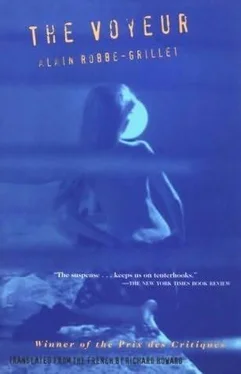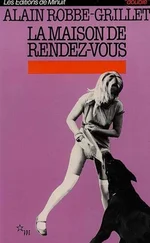“We’re going to be late for soup again,” he said, counting out the money on the tin slab that covered the bar.
For the first time since he had left town, the salesman looked at his watch—it was after one—one-seven, exactly. He had already been on the island over three hours—three hours and one minute. And he had sold only two wrist watches, both at one hundred fifty crowns.
“I’ll have to hurry,” said the second workman, “on account of the kids going to school.”
The proprietress picked up the money with a quick movement of her hand, smiled, and said “Thank you, gentlemen!” She put the coffee mill in a cupboard. She had not emptied the tray after having ground the beans.
“Yes, children are a lot of trouble,” Mathias repeated.
The two lighthouse employees had left. He thought, too late, that he should have tried to sell them watches. But he still had to obtain information on two points: where was Maria Leduc going after she left Black Rocks? Why had she mentioned him? He tried to find some expression that would give an air of indifference to the question.
“And sometimes satisfaction, too,” the fat woman said.
The salesman nodded. “Of course they are!” And, after a pause, “One man’s trouble…” he began.
He went no further. That was not at all the right formula.
“Maria went home,” the woman continued, “by the path along the cliff.”
“That’s no short cut,” Mathias declared, hoping to find out if it was.
“It’s a short cut if you’re walking; but with her bicycle, she’ll take longer that way than by the road. She wanted to see if Jacqueline would be playing down on the rocks, near Devil’s Hole.”
“Maybe she wasn’t that far away. She might not have heard Maria on account of the wind. They’ll find her peacefully tending her sheep in the usual place, like a good girl.”
A good girl. Peaceful, in the quiet hollow.
“Then too,” said the woman, “they may find her still prowling around here—over at the lighthouse. And maybe not alone either. At thirteen, it’s hard to believe.”
“Bah! She can’t do anything very bad…. She wasn’t going to play too close to the edge, was she—where the rocks are dangerous? Sometimes it caves in in places. You have to watch where you put your feet.”
“Don’t worry about that. She’s a lively one!”
Lively. She was. Lively. Alive. Burned alive.
“Anyone can lose his footing,” the salesman said. -
He took his wallet from the inside pocket of his jacket and removed a ten-crown note from it. He took advantage of this movement to put back in place a newspaper clipping that stuck out a little beyond the other papers. Then he held out the note to the proprietress. When she gave him his change, he noticed that she put the coins on the counter, one by one, with her left hand.
Then she picked up his glass which rapidly underwent the series of ablutionary operations: sink, circular rubbing, tap, drainboard. Now the three identical glasses were again lined up on the drainboard—as they had been on top of the bar—but at a noticeably lower level this time, and nearer one another besides, empty (that is, transparent and colorless instead of opaque because of the brown liquid which had filled them so perfectly), and upside down. Nevertheless, the shape of these glasses—a cylinder bulging at the middle—made their silhouettes virtually the same whether they were standing rightside up or on their rims.
Mathias’ situation was unchanged. Neither his own reasoning nor the proprietress’ words had enlightened him on the essential point: why had Maria Leduc just mentioned his presence on the island apropos of her sister’s disappearance? That was the one thing to find out, and he would scarcely further his knowledge on the point by disputing the existence of more or less favorable short cuts in the inextricable tangle of paths that ran along the cliff top in all directions.
Why would the girl have mentioned him, unless she had seen him riding over the moor—“under the crossroads”—where there was no reason for him to be? The fact that he had not seen her was all too easy to explain. Their two paths, separated from each other by the considerable unevenness of the ground, had only a few privileged points from which two observers could see each other at the same time. At a given moment he and the girl had occupied these favorable positions, but she alone had turned in his direction, so that the reciprocity of their points of view had not functioned. At that particular moment Mathias had his eyes somewhere else—on the ground, for instance, or raised toward the sky, or looking in any direction except the right one.
The girl, on the contrary, had immediately identified the person she had glimpsed by the shiny bicycle and the little brown suitcase her mother had just described to her. There was no possibility of a mistake. Now she was hoping he might know where her sister was hiding, for he seemed to be coming back from where she was supposed to be. And if there was a chance that the mother had related the salesman’s remarks about his itinerary incorrectly, Maria might even have been positive that he was coming back from the cliff top. And in fact he remembered that while he had been trying to leave the overly talkative Madame Leduc without being actually rude, she had spoken of an eventual meeting between him and her youngest daughter. The idea was a preposterous one, of course. What would he be doing on that awkward path without any houses along it and leading nowhere?—except to the sea, to steep rocks, to a hollow sheltered from the wind, and five sheep grazing on their pickets under the superfluous vigilance of a thirteen-year-old child.
He had recognized Violet immediately, she was wearing the same peasant-girl disguise she had on in the photograph. Her thin black cotton dress was more suitable for midsummer, but it was so warm at the bottom of the hollow that it seemed like August. Violet was there on the sunny grass, half-sitting, half-kneeling, her legs bent under her, the rest of her body vertical and slightly twisted toward the right in a rather strained attitude. Her right ankle and foot protruded from under the top of her thigh; the other leg remained completely invisible below the knee. Her arms were lifted, her elbows bent, and her hands were at the nape of her neck—as if arranging her hair behind her head. A gray sweater was lying next to her on the ground. The sleeveless dress exposed the hollows of her armpits.
Turned toward him, she had not moved as he approached, her eyes wide as they met his. But on reflection Mathias wondered whether she was looking at him or at something behind him—something of enormous size. Her pupils remained fixed; not a feature of her face moved. Without lowering her eyelids or shifting her uncomfortable position, she twisted the upper part of her body to the left.
He had to say something at any cost. The three glasses on the drainboard were nearly dry. The woman picked them up one after another and gave them a quick wipe of her towel; they disappeared under the counter from where she had originally taken them. They were lined up again at the end of a long row of others—all invisible to customers standing at the counter.
But arrangement by rows being impractical for serving, they were grouped in rectangles on the shelves: the three apéritif glasses had just been set down next to three similar glasses, ending a first series of six. A second identical series was just behind, then a third, a fourth, etc…. The sequence disappeared in the darkness at the back of the cupboard. To the right and to the left of this series, and on the shelves above and below it as well, were arranged other rectangular series of glasses: they varied in shape and size, rarely in color.
Читать дальше












